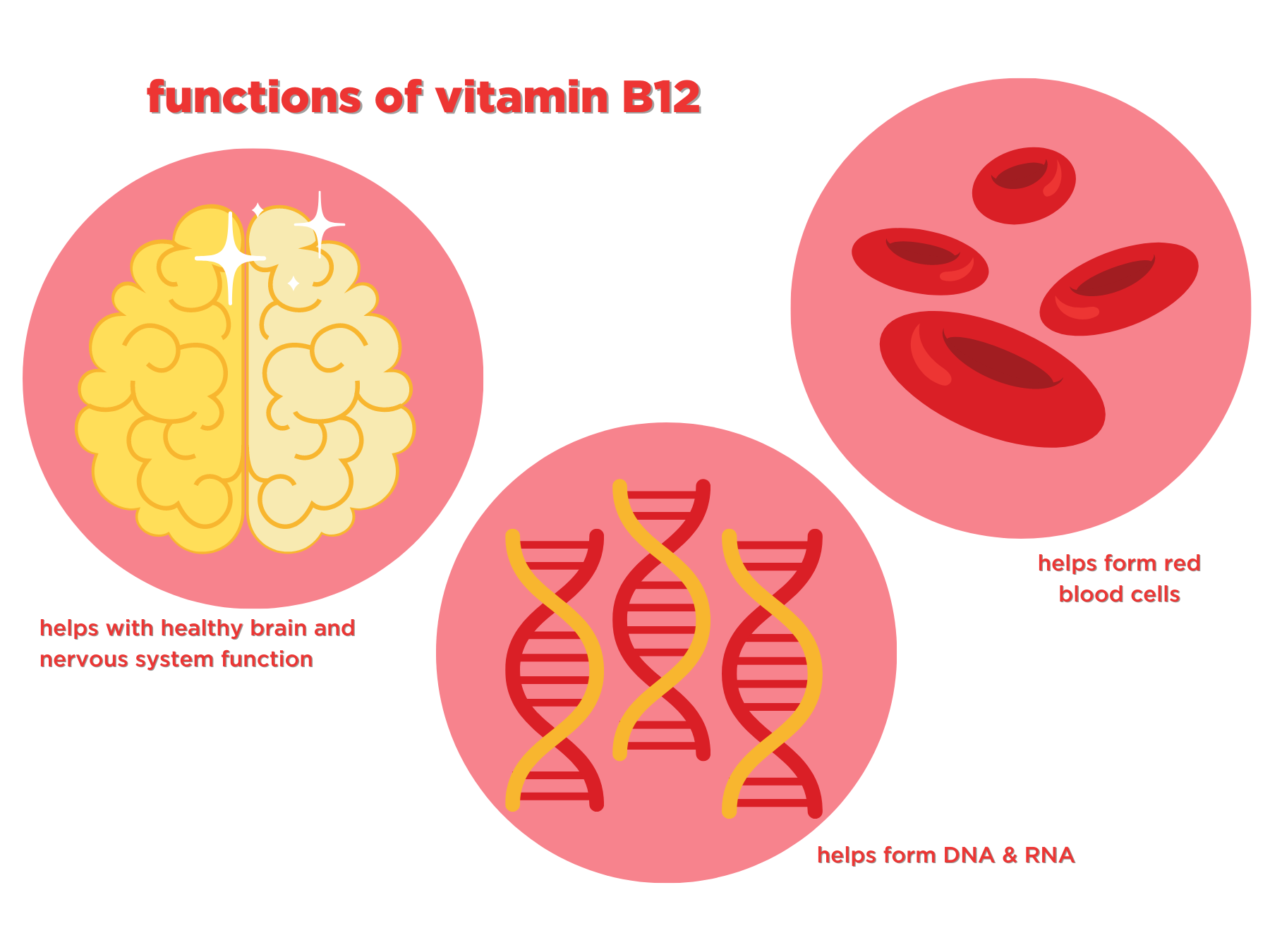
Why do you need vitamin B12?
Nearly 100 years ago, scientists began to discover a connection between common diseases and nutrition deficiencies. One finding was the association of vitamin B12 levels and pernicious anemia, a decrease in red blood cells due to the body’s inability to absorb enough vitamin B-12.
Advances in science revealed that intrinsic factor, a protein made by cells in the stomach lining, was missing in people with pernicious anemia. Intrinsic factor helps the body’s intestines absorb vitamin B12. Interesting fact: vitamin B12 was isolated, crystallized, and characterized in the laboratory of Dorothy Hodgkin, contributing to her Nobel Prize in 1964.” 1
Vitamin B12, also called cobalamin, plays a key role in the formation of DNA and red blood cells, and in maintaining healthy brain and nerve cells.
Sources of Vitamin B12
Because the body cannot make B12 on its own, food or supplementation is needed to make sure daily requirements are met. Vitamin B12 is found naturally in a wide variety of animal proteins and is also added to some fortified foods like cereal. Plant foods do not contain vitamin B12 unless they are fortified, which puts vegetarians at a higher risk for B12 deficiency. 2
You can get recommended amounts of vitamin B12 by eating a variety of foods including fish, meat, poultry, eggs, milk, and other dairy products. An 8 oz glass of 2% milk contains half of your daily requirements of B12. 3
What Happens When You Don’t Get Enough?
Your body stores 1,000 to 2,000 times as much vitamin B12 as you would typically eat in a day, so the symptoms of vitamin B12 deficiency can take several years to appear. If you have a vitamin B12 deficiency, you may feel tired or weak. You might also have pale skin, heart palpitations, loss of appetite, weight loss, and infertility. Your hands and feet might become numb or tingly, a sign of nerve problems. Other symptoms of vitamin B12 deficiency include problems with balance, depression, confusion, dementia, poor memory, and soreness of the mouth or tongue.4
Daily Requirements
According to the 2020-2025 Dietary Guidelines for Americans men and women over 19 should aim for 2.4 mcg per day. Pregnancy bumps that requirement up to 2.6 mcg and those that are breastfeeding need the most at 2.8 mcg per day.5
| Age | RDA |
| Adults over 19 | 2.4 mcg |
| Pregnancy | 2.6 mcg |
| Lactation | 2.8 mcg |
Enjoy this fun and tasty appetizer to get your daily requirement of Vitamin B12!
Pineapple Jalapeño and Prosciutto Bites
A fancy, bite sized version of Hawaiian pizza, minus the carbs!
Lynn Burch is a Nutrition major at Arizona State University. In her free time, she enjoys cycling, traveling, and learning everything she can about healing your body with food and activity.
References
- Scott JM, Molloy AM. The discovery of vitamin B(12). Ann Nutr Metab. 2012;61(3):239-45. doi: 10.1159/000343114. Epub 2012 Nov 26. PMID: 23183296.
- Vitamin B12 – do you know everything? – researchgate. https://www.researchgate.net/profile/Lata-Kanyal-Butola/publication/344804062_Vitamin_B12_-Do_You_Know_Everything/links/5f911846299bf1b53e3a2b61/Vitamin-B12-Do-You-Know-Everything.pdf . Accessed April 17, 2022.
- Dairy Nutrition & Vitamins. & Vitamins | U.S. Dairy. https://www.usdairy.com/dairy-nutrition . Accessed April 15, 2022.
- Vitamin B12. NIH Office of Dietary Supplements. https://ods.od.nih.gov/factsheets/VitaminB12-HealthProfessional/ . Accessed April 14, 2022.
- Home | dietary guidelines for Americans. https://www.dietaryguidelines.gov/sites/default/files/2021-03/Dietary_Guidelines_for_Americans-2020-2025.pdf . Accessed April 17, 2022.


